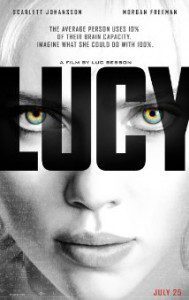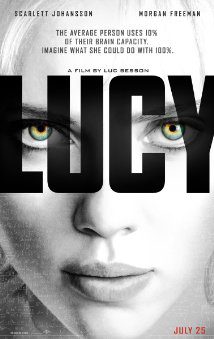 I watched the film LUCY last night. The premise of the film is delightful: what if we were able to use our full intellectual capacity? What if we be able to activate 100% of our brain’s computing power? While I was lured into the idea that this was another view on the debate and merits of artificial intelligence, one of the most fascinating elements of the film, for me, was the discussion around time.
I watched the film LUCY last night. The premise of the film is delightful: what if we were able to use our full intellectual capacity? What if we be able to activate 100% of our brain’s computing power? While I was lured into the idea that this was another view on the debate and merits of artificial intelligence, one of the most fascinating elements of the film, for me, was the discussion around time.
In a script written by the talented director, Luc Besson, Professor Norman (played by Morgan Freeman) suggests that the living organism (cell) has two options: to become immortal or to reproduce.
You sell it? -This is the purpose of our business.
For us to be like the only purpose seems to be to save time.
It seems that the cell also want to save time.
All the cells that make up the worm or human has only two options …
Immortality …
Or reproduction.
If its habitat is not quite favorable …
The cell chooses immortality …
That is to say, self-sufficiency, self …
But if the habitat is favorable …
This is the reproduction is selected.
And when they die the essential data is passed to the following cells …
Who in turn pass on these cells …
The knowledge, knowledge is devised through time.”
Time is thus an infinite concept or one that must operate in cycles. In Professor Norman’s lecture, he also talks about the transmission of data, of knowledge as part of the cycle of reproduction. But, as we get more intelligent, are we able to transmit, much less capture that intelligence? Is intelligence something we are destined to improve, as a part of a Darwinian evolution?
100% Intelligence versus Artificial Intelligence
As seductive as the concept of all prescient intelligence might be, it also comes with certain risks — as evidenced by the film. In whose hands (or heads) that intelligence falls is of particular concern. Whether that intelligence is “natural” or “artificial,” the issue of governance remains. Professor Stephen Hawking warned us recently of the limits and dangers of artificial intelligence, leading to the notion of singularity, when computers are able to learn and develop for themselves.
The development of full artificial intelligence could spell the end of the human race. It would take off on its own, and re-design itself at an ever-increasing rate” (BBC)
The main character, Lucy (played convincingly by Scarlett Johansson), talks toward the end of this apocalyptic orgy of intelligence, about the importance of time as means of defining who we are. She says:
Time is the reason for its own existence, the ultimate measure.
It attributes its existence to matter …
Without time, it does not exist.
Time is unity.
{Film Script}
I wonder, though, to what extent time is unity? Can it be or is it viewed in the same way across cultures? Time and time management is certainly conceived differently by different cultures. Is Lucy’s vision, then, a predominantly western view of the world and of time, or is it a universal truth?
Your thoughts?












Time is mainly considered as either cyclical or linear, In the cyclical version, history repeats itself, there is no way for progress. Tradition prevails. This view is held in most Eastern cultures, and used to be in the West as well until the idea of progress in civilisation erupted and disrupted thoughts. Linear time meant going towards scientific, and thereafter social progress. There is no immortality since time is definite, limited, even the universe experiences time through its expansion. Would time be the essential truth? the final judgment?
It is funny (if not sad) how we say that “history repeats itself.” At its core, around this notion of time, we seem to be debating whether we are able (or are programmed) to progress as a race. Time is that dimension that makes space and cosmology so fascinating. One thing is for sure: we all live with the same 24-hour day, so it would stand to reason that the way we mark time defines who we are.
Adam and Eve were instructed to not eat the fruit from the tree of knowledge or they would surely die … this suggest to me the Garden of Eden exist outside of time.
Hi Karen, I’d love to understand better! Because otherwise they were immortal?